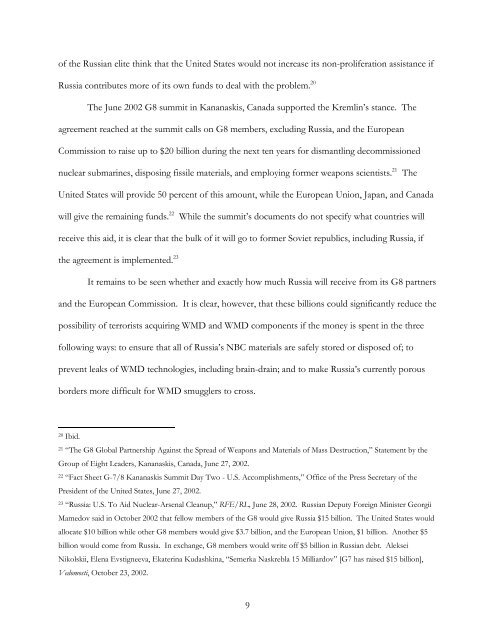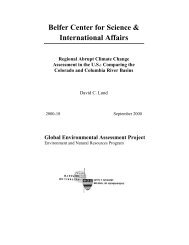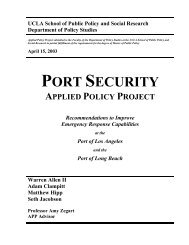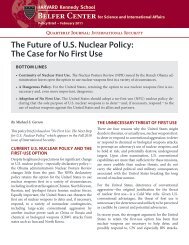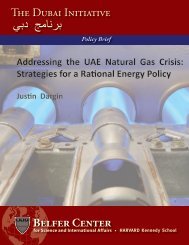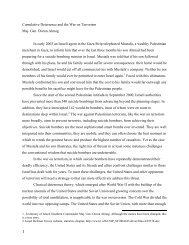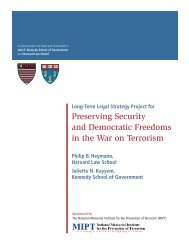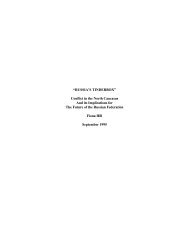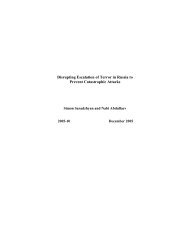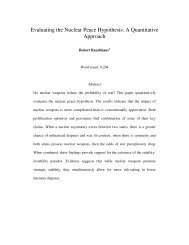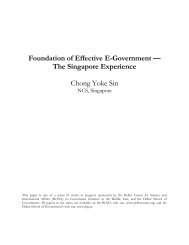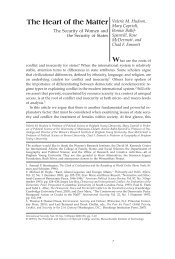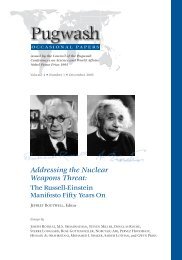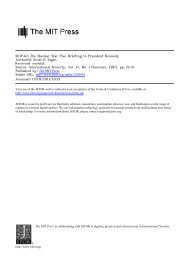Russia - Belfer Center for Science and International Affairs - Harvard ...
Russia - Belfer Center for Science and International Affairs - Harvard ...
Russia - Belfer Center for Science and International Affairs - Harvard ...
You also want an ePaper? Increase the reach of your titles
YUMPU automatically turns print PDFs into web optimized ePapers that Google loves.
of the <strong>Russia</strong>n elite think that the United States would not increase its non-proliferation assistance if<br />
<strong>Russia</strong> contributes more of its own funds to deal with the problem. 20<br />
The June 2002 G8 summit in Kananaskis, Canada supported the Kremlin’s stance. The<br />
agreement reached at the summit calls on G8 members, excluding <strong>Russia</strong>, <strong>and</strong> the European<br />
Commission to raise up to $20 billion during the next ten years <strong>for</strong> dismantling decommissioned<br />
nuclear submarines, disposing fissile materials, <strong>and</strong> employing <strong>for</strong>mer weapons scientists. 21 The<br />
United States will provide 50 percent of this amount, while the European Union, Japan, <strong>and</strong> Canada<br />
will give the remaining funds. 22 While the summit’s documents do not specify what countries will<br />
receive this aid, it is clear that the bulk of it will go to <strong>for</strong>mer Soviet republics, including <strong>Russia</strong>, if<br />
the agreement is implemented. 23<br />
It remains to be seen whether <strong>and</strong> exactly how much <strong>Russia</strong> will receive from its G8 partners<br />
<strong>and</strong> the European Commission. It is clear, however, that these billions could significantly reduce the<br />
possibility of terrorists acquiring WMD <strong>and</strong> WMD components if the money is spent in the three<br />
following ways: to ensure that all of <strong>Russia</strong>’s NBC materials are safely stored or disposed of; to<br />
prevent leaks of WMD technologies, including brain-drain; <strong>and</strong> to make <strong>Russia</strong>’s currently porous<br />
borders more difficult <strong>for</strong> WMD smugglers to cross.<br />
20 Ibid.<br />
21 “The G8 Global Partnership Against the Spread of Weapons <strong>and</strong> Materials of Mass Destruction,” Statement by the<br />
Group of Eight Leaders, Kananaskis, Canada, June 27, 2002.<br />
22 “Fact Sheet G-7/8 Kananaskis Summit Day Two - U.S. Accomplishments,” Office of the Press Secretary of the<br />
President of the United States, June 27, 2002.<br />
23 “<strong>Russia</strong>: U.S. To Aid Nuclear-Arsenal Cleanup,” RFE/RL, June 28, 2002. <strong>Russia</strong>n Deputy Foreign Minister Georgii<br />
Mamedov said in October 2002 that fellow members of the G8 would give <strong>Russia</strong> $15 billion. The United States would<br />
allocate $10 billion while other G8 members would give $3.7 billion, <strong>and</strong> the European Union, $1 billion. Another $5<br />
billion would come from <strong>Russia</strong>. In exchange, G8 members would write off $5 billion in <strong>Russia</strong>n debt. Aleksei<br />
Nikolskii, Elena Evstigneeva, Ekaterina Kudashkina, “Semerka Naskrebla 15 Milliardov” [G7 has raised $15 billion],<br />
Vedomosti, October 23, 2002.<br />
9


